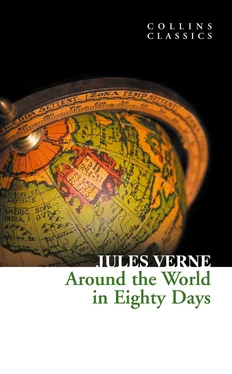Fix was going to get in another car, when a thought stopped him, and suddenly modified his plan of departure. “No, I will remain,” he said to himself. “A transgression committed upon Indian territory. I have my man.”
At this moment the locomotive gave a vigorous whistle, and the train disappeared in the darkness.
In which Phileas Fogg buys a Conveyance at a Fabulous Price
The train had started to time. It carried a certain number of travellers, some officers, civil officials, and opium and indigo merchants, whose business called them to the eastern part of the peninsula.
Passepartout occupied the same compartment as his master. A third traveller was in the opposite corner.
It was the brigadier-general, Sir Francis Cromarty, one of the partners of Mr Fogg during the trip from Suez to Bombay, who was rejoining his troops, stationed near Benares.
Sir Francis Cromarty, tall, fair, about fifty years old, who had distinguished himself highly during the last revolt of the Sepoys, had truly deserved to be called a native. From his youth he had lived in India, and had only been occasionally in the country of his birth. He was a well-posted man, who would have been glad to give information as to the manners, the history, the organisation of this Indian country, if Phileas Fogg had been the man to ask for such things. But this gentleman was not asking anything. He was not travelling, he was describing a circumference. He was a heavy body, traversing an orbit around the terrestrial globe, according to the laws of rational mechanics. At this moment he was going over in his mind the calculations of the hours consumed since his departure from London, and he would have rubbed his hands, if it had been in his nature to make a useless movement.
Sir Francis Cromarty had recognised the originality of his travelling companion, although he had only studied him with his cards in his hand, and between two rubbers. He was ready to ask whether a human heart beat beneath this cold exterior, whether Phileas Fogg had a soul alive to the beauties of nature and to moral aspirations. That was the question for him. Of all the oddities the general had met, none were to be compared to this product of the exact sciences. Phileas Fogg had not kept secret from Sir Francis Cromarty his plan for a tour around the world, nor the conditions under which he was carrying it out. The general saw in this bet only an eccentricity without a useful aim, and which was wanting necessarily in the transire benefaciendo which ought to guide every reasonable man. In the manner in which this singular gentleman was moving on, he would evidently be doing nothing, either for himself or for others.
An hour after having left Bombay, the train, crossing the viaducts, had left behind the Island of Salcette and reached the mainland. At the station Callyan, it left to the right the branch which, via Kandallah and Pounah descends towards the south-east of India, and reaches the station Panwell. At this point, it became entangled in the defiles of the Western Ghaut mountains, with bases of trappe and basalt, whose highest summits are covered with thick woods.
From time to time, Sir Francis Cromarty and Phileas Fogg exchanged a few words, and at this moment the general, recommencing a conversation which frequently lagged, said:
“A few years ago, Mr Fogg, you would have experienced at this point a delay which would have probably interrupted your journey.”
“Why so, Sir Francis?”
“Because the railway stopped at the base of these mountains, which had to be crossed in a palanquin or on a pony’s back as far as the station of Kandallah, on the opposite slope.”
“That delay would not have deranged my programme,” replied Mr Fogg. “I would have foreseen the probability of certain obstacles.”
“But, Mr Fogg,” replied the general, “you are in danger of having a bad business on your hands with this young man’s adventure.”
Passepartout, with his feet wrapped up in his cloak, was sleeping soundly, and did not dream that they were talking about him.
“The British Government is extremely severe, and rightly, for this kind of trespass,” replied Sir Francis Cromarty. “It insists, above all things, that the religious customs of the Hindus shall be respected, and if your servant had been taken—”
“Yes, if he had been taken, Sir Francis,” replied Mr Fogg, “he would have been sentenced, he would have undergone his punishment, and then he would have quietly returned to Europe. I do not see how this matter could have delayed his master!”
And, thereupon, the conversation stopped again. During the night, the train crossed the Ghauts, passed on to Nassik, and the next day, the 21st of October, it was hurrying across a comparatively flat country, formed by the Khandeish territory. The country, well cultivated, was strewn with small villages, above which the minaret of the pagoda took the place of the steeple of the European church. Numerous small streams, principally tributaries of the Godavery, irrigated this fertile country.
Passepartout having waked up, looked around, and could not believe that he was crossing the country of the Hindus in a train of the Great Peninsular Railway. It appeared improbable to him. And yet there was nothing more real! The locomotive, guided by the arm of an English engineer and heated with English coal, was puffing out its smoke over plantations of cotton trees, coffee, nutmeg, clove, and red pepper. The steam twisted itself into spirals about groups of palms, between which appeared picturesque bungalows, a few viharis (a sort of abandoned monasteries), and wonderful temples enriched by the inexhaustible ornament of Indian architecture. Then immense reaches of country stretched out of sight, jungles, in which were not wanting snakes and tigers whom the noise of the train did not frighten, and finally forests cut through by the route of the road, still the haunt of elephants, which, with a pensive eye, looked at the train as it passed so rapidly.
During the morning, beyond the station of Malligaum, the travellers traversed that fatal territory, which was so frequently drenched with blood by the sectaries of the goddess Kali. Not far off rose Ellora and its splendid pagodas, and the celebrated Aurungabad, the capital of the ferocious Aureng-Zeb, now simply the principal place of one of the provinces detached from the kingdom of Nizam. It was over this country that Feringhea, the chief of the Thugs, the king of stranglers, exercised his dominion. These assassins, united in the association that could not be reached, strangled in honour of the goddess of death, victims of every age, without ever shedding blood, and there was a time when the ground could not be dug up anywhere in this neighbourhood without finding a corpse. The British Government has been able, in great part, to prevent these murders, but the horrible organisation exists yet, and carries on its operations.
At half-past twelve, the train stopped at the station at Burhampour, and Passepartout was able to obtain for gold a pair of Indian slippers, ornamented with false pearls, which he put on with an evident show of vanity. The travellers took a hasty breakfast, and started again for Assurghur, after having for a moment stopped upon the shore of the Tapty, a small river emptying into the Gulf of Cambay, near Surat.
It is opportune to mention the thoughts with which Passepartout was busied. Until his arrival at Bombay, he had thought that matters would go no farther. But now that he was hurrying at full speed across India, his mind had undergone a change. His natural feelings came back to him with a rush. He felt again the fancied ideas of youth, he took seriously his master’s plans, he believed in the reality of the bet, and consequently in this tour of the world, and in this maximum of time which could not be exceeded. Already he was disturbed at the possible delays, the accidents which might occur upon the route. He felt interested in the wager, and trembled at the thought that he might have compromised it the evening before by his unpardonable foolishness, so that, much less phlegmatic than Mr Fogg, he was much more uneasy. He counted and recounted the days that had passed, cursed the stopping of the train, accused it of slowness, and blamed Mr Fogg in petto for not having promised a reward to the engineer. The good fellow did not know that what was possible upon a steamer was not on a railway train, whose speed is regulated.
Читать дальше












